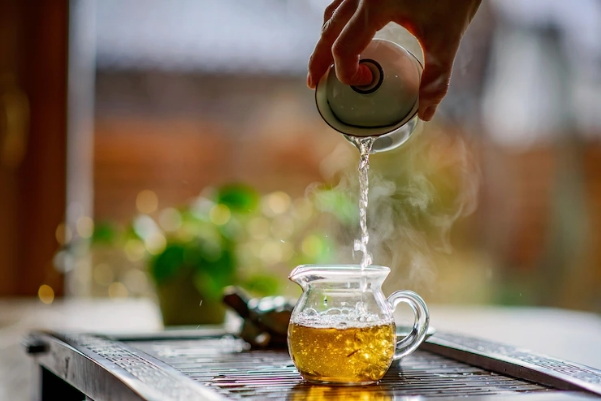Content Menu
● The Composition of Green Tea Leaf Extract
● Mechanisms of Action
● Health Benefits of Green Tea Leaf Extract
● Green Tea's Role in Gut Health
● Green Tea for Skin Health
● How to Use Green Tea Leaf Extract
● Potential Side Effects
● Conclusion
● FAQ
>> 1. What are the main components of green tea leaf extract?
>> 2. Can green tea leaf extract help with weight loss?
>> 3. Is there any risk associated with taking green tea extract?
>> 4. How much green tea should I drink daily for health benefits?
>> 5. Can I apply green tea extract topically?
● Citations:
Green tea has been consumed for centuries, not only for its refreshing taste but also for its numerous health benefits. The extract derived from green tea leaves, primarily known for its high concentration of antioxidants, particularly catechins, has gained significant attention in the health and wellness community. This article explores the mechanisms of action behind green tea leaf extract, its health benefits, and how it works within the body.

The Composition of Green Tea Leaf Extract
Green tea leaf extract is derived from the leaves of the Camellia sinensis plant. The primary active components in green tea are catechins, a type of flavonoid that exhibits potent antioxidant properties. The most notable catechin in green tea is epigallocatechin gallate (EGCG), which is believed to be responsible for many of its health benefits.
- Catechins: These are polyphenolic compounds that help combat oxidative stress by neutralizing free radicals in the body.
- Caffeine: While present in lower amounts than coffee, caffeine in green tea can enhance metabolic rate and improve energy levels.
- L-theanine: An amino acid that promotes relaxation without drowsiness, it works synergistically with caffeine to improve cognitive function.
Mechanisms of Action
Green tea leaf extract exerts its effects through various biological pathways:
1. Antioxidant Activity: The catechins in green tea scavenge free radicals, reducing oxidative stress and preventing cellular damage. This activity is crucial for protecting against chronic diseases such as cancer and cardiovascular diseases.
2. Anti-inflammatory Effects: Green tea extracts have been shown to inhibit inflammatory markers and pathways. For instance, EGCG can suppress the expression of pro-inflammatory cytokines, which play a role in various inflammatory conditions.
3. Weight Management: Research indicates that green tea extract can enhance fat oxidation and improve metabolic rate. The catechins inhibit enzymes involved in fat digestion, leading to reduced fat absorption and increased fat burning during exercise.
4. Heart Health: Green tea has been linked to improved cardiovascular health by lowering LDL cholesterol levels and improving arterial function. Catechins prevent the oxidation of LDL cholesterol, a key factor in heart disease.
5. Neuroprotective Effects: Studies suggest that EGCG may protect neurons from damage associated with neurodegenerative diseases like Alzheimer's. It enhances brain function by promoting blood flow and reducing inflammation in the brain.
Health Benefits of Green Tea Leaf Extract
The consumption of green tea leaf extract is associated with numerous health benefits:
- Cancer Prevention: Epidemiological studies suggest that regular consumption of green tea may lower the risk of certain types of cancer, including breast, prostate, and colorectal cancers. The antioxidants in green tea help inhibit tumor growth and induce apoptosis (programmed cell death) in cancer cells.
- Improved Metabolic Health: Green tea extract may help regulate blood sugar levels and improve insulin sensitivity, making it beneficial for managing type 2 diabetes.
- Enhanced Skin Health: Topical application of green tea extract can reduce signs of aging by improving skin elasticity and reducing wrinkles. Its anti-inflammatory properties also help manage acne and other skin conditions.
- Weight Loss Support: By increasing thermogenesis (the production of heat) and fat oxidation, green tea can assist in weight management efforts when combined with a healthy diet and exercise regimen.

Green Tea's Role in Gut Health
Recent studies have highlighted the impact of green tea on gut microbiota, suggesting that it can promote the growth of beneficial bacteria while inhibiting harmful ones. This interaction may contribute to various health benefits:
- Microbial Balance: Green tea polyphenols can help correct dysbiosis (microbial imbalance) associated with conditions such as obesity and inflammatory bowel disease.
- Metabolite Production: Gut bacteria metabolize catechins into smaller bioactive molecules that may exert additional health benefits.
Green Tea for Skin Health
The topical application of green tea extracts has gained popularity due to their skin-enhancing properties:
- Antioxidant Protection: The antioxidants in green tea protect skin cells from UV damage and environmental stressors, potentially reducing the risk of skin cancer.
- Anti-Aging Effects: Studies have shown that EGCG can stimulate collagen production while inhibiting enzymes responsible for collagen breakdown, leading to improved skin elasticity and reduced wrinkles[1][3].
- Acne Treatment: Green tea's antibacterial properties can help reduce acne-causing bacteria on the skin while regulating sebum production[3][14].
How to Use Green Tea Leaf Extract
Green tea leaf extract is available in various forms:
- Tea Bags: Brewing loose leaf or bagged green tea is a common way to enjoy its benefits.
- Capsules or Tablets: Concentrated forms are available for those who prefer supplements over drinking tea.
- Powdered Form (Matcha): Matcha is a powdered form of green tea that provides a higher concentration of catechins since the whole leaf is consumed.
Potential Side Effects
While green tea leaf extract is generally safe for most people when consumed in moderation, excessive intake may lead to side effects such as:
- Caffeine Sensitivity: Some individuals may experience anxiety or insomnia due to caffeine content.
- Liver Toxicity: High doses of concentrated extracts have been linked to liver issues; therefore, moderation is essential[11][31].
Conclusion
Green tea leaf extract is a powerful natural supplement with numerous health benefits primarily attributed to its high content of catechins, particularly EGCG. Its antioxidant properties help combat oxidative stress, while its anti-inflammatory effects contribute to overall health improvement. Regular consumption may support weight management, enhance metabolic health, promote heart health, provide neuroprotective benefits, and improve skin condition.

FAQ
1. What are the main components of green tea leaf extract?
The main components include catechins (especially EGCG), caffeine, and L-theanine.
2. Can green tea leaf extract help with weight loss?
Yes, it can enhance fat oxidation and increase metabolic rate when combined with a healthy lifestyle.
3. Is there any risk associated with taking green tea extract?
In high doses, it may cause liver issues or interact with certain medications; moderation is key.
4. How much green tea should I drink daily for health benefits?
Most studies suggest consuming 2 to 4 cups per day to reap the maximum benefits without adverse effects.
5. Can I apply green tea extract topically?
Yes, it can be used in skincare products to reduce inflammation and signs of aging.
Citations:
[1] https://pmc.ncbi.nlm.nih.gov/articles/PMC6412948/
[2] https://www.spandidos-publications.com/10.3892/br.2022.1515?text=fulltext
[3] https://cityskinclinic.com/green-tea-skin-benefits/
[4] https://www.nature.com/articles/srep12015
[5] https://www.pharmacytimes.com/view/health-benefits-of-tea-shown-to-improve-immune-function-cardiovascular-health
[6] https://www.mountsinai.org/health-library/herb/green-tea
[7] https://pubmed.ncbi.nlm.nih.gov/28899506/
[8] https://pmc.ncbi.nlm.nih.gov/articles/PMC8271705/
[9] https://www.newbyteas.com/us/journal/the-immune-boosting-benefits-of-green-tea?___store=us
[10] https://www.medicalnewstoday.com/articles/269538
[11] https://www.healthline.com/nutrition/10-benefits-of-green-tea-extract
[12] https://www.mdpi.com/1420-3049/29/19/4575
[13] https://www.nccih.nih.gov/health/green-tea
[14] https://www.healthline.com/health/benefits-of-green-tea-for-skin
[15] https://pubmed.ncbi.nlm.nih.gov/15464031/
[16] https://www.healthline.com/health/immune-boosting-green-tea-used-3-ways
[17] https://www.webmd.com/vitamins/ai/ingredientmono-960/green-tea
[18] https://pmc.ncbi.nlm.nih.gov/articles/PMC6930595/
[19] https://ehe.osu.edu/news/listing/green-tea-extract-promotes-gut-health-lowers-blood-sugar
[20] https://www.healthline.com/nutrition/top-10-evidence-based-health-benefits-of-green-tea
[21] https://www.healthline.com/nutrition/camellia-sinensis-leaf-extract
[22] https://www.paulaschoice.com/ingredient-dictionary/ingredient-green-tea.html
[23] https://www.webmd.com/diet/health-benefits-green-tea
[24] https://pubmed.ncbi.nlm.nih.gov/15992239/
[25] https://www.mdpi.com/2079-9284/9/5/96
[26] https://www.urmc.rochester.edu/encyclopedia/content?contenttypeid=19&contentid=greenteaextract
[27] https://www.itcosmetics.com/green-tea.html
[28] https://formulabotanica.com/green-tea-cosmetic-formulations/
[29] https://www.nature.com/articles/s41598-024-59383-y
[30] https://pmc.ncbi.nlm.nih.gov/articles/PMC9370301/
[31] https://health.clevelandclinic.org/green-tea-extract-a-better-way-to-boost-energy-or-not






























